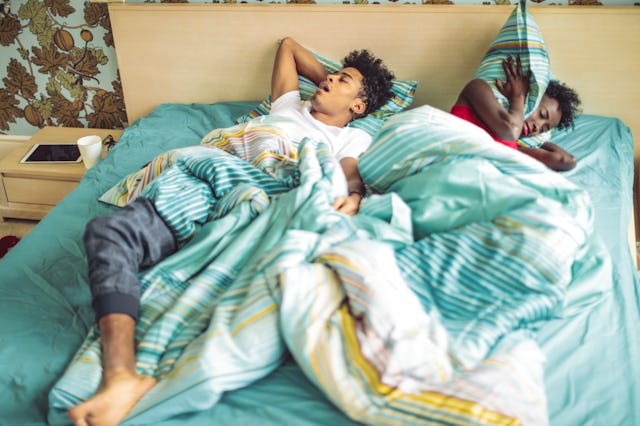Should You and Your Partner Sleep Separately? What The Research Shows Now
One in four couples sleep separately. Should you be one of them?

Remember the rare moments on I Love Lucy when the viewer got a peek into Lucy and Ricky’s bedroom? If you’re like most people, the first thing you noticed — the only thing you noticed — were the impeccably made little beds, sat side by side as if for siblings. You wondered how exactly their son, Little Ricky, came to be. Did they trade off which bed they used for sex (“Your twin or mine, darling?”), or push them together—and if it was the latter, had anyone ever fallen through the crack?
Though Lucy and Ricky’s bisected bedroom was more about appeasing 1950s TV censors than a preferred sleeping arrangement, separate sleep has long been a quiet presence in the world of coupledom — and a more prevalent one than you might think. In 2004, the National Sleep Foundation conducted a random telephone survey asking Americans about their sleep habits and learned that roughly one in four couples (23%) sleeps separately. More recently, a 2014 survey conducted by FiveThirtyEight.com found that a slightly more moderate 13.6% of couples sleep separately every night, and a further 4.3% do so a few times a month. (However, the Ricky-Lucy configuration is no longer in vogue: those who bed down alone tend to do so in separate rooms.) If we extrapolate from those numbers, applying them to the entire married population of America, that’s roughly eight million couples who snooze solo.
So, the big question is: Why? And if this many couples are happily going their separate ways at bedtime, should you be among them?
There are all kinds of reasons why two people might not be able to sleep compatibly, from differing temperature needs to a tendency to violently flail while dreaming. But the most common impetus for sleeping separately is snoring — a whopping 45.6% of the couples interviewed gave this as their reason. If you and your partner are keeping each other up, it makes sense to preserve your sleep as best you can, says Dr. Abhinav Singh, Medical Review Expert at Sleepfoundation.org and Medical Director of the Indiana Sleep Center. “If couples have different sleeping preferences in terms of timing, temperature, medical ailments, or work schedules,” says Singh, “then dedicating a protected 7+ hours in separate environments is a reasonable consideration.”
The problem, though, is that many couples have a strange terror of sleeping apart, believing it’s a sign of injured intimacy, a romantic failing — and the first step down the slippery slope to sexlessness. But those in the know say these concerns are rooted in the psyche, not in science. In an essay for the TED blog, sleep expert Wendy M. Troxel, Ph.D., writes, “There’s a lot of pressure around the meaning of the shared bed, but this is largely a socially constructed belief system, not science based.” In fact, going strictly by the data, sleeping with another person actually results in worse sleep. Yet we tend to put the desire for closeness above the need for good rest. Which is counterproductive when you consider the research that shows how poor sleep can have a damaging impact on relationships—or, for that matter, the data that reveals how better sleep can make you a stronger communicator with a better outlook, which can only yield positive results in a relationship. Says Singh, “When it comes to couples, if one person is sleeping poorly, both suffer the consequences. The under-slept individual will be irritable, tired, moody, and not at their best, and this will impact the one who is sleeping well.”
There may be no better argument for a two-bed system than anecdotal evidence from couples who’ve separated their sleep and are far happier for it. Last fall, Buzzfeed asked partners who don’t share a bed to explain why that setup works for them, and whether it’s impacted their level of intimacy. “We haven’t had any emotional effects,” wrote one respondent. “We're closer than ever and happier than before.” Another said, “Intimacy is not an issue at all. I think we are both better people when we’ve had a restful night’s sleep.” Singh rightly points out that a far bigger intimacy killer than sleeping separately is exhaustion: “A tired partner is likely to have much less interest in sex if they are chronically sleeping poorly.”
But one separate-sleeper in the Buzzfeed article had some especially wise words to share, highlighting the fact that what you and your partner do in daylight far outweighs how you catch your Zzz’s. She wrote, “Do whatever makes you comfortable, and if you feel it brings you apart, change how you spend your time together when you are awake.” Singh also had some parting wisdom to share. “Restful sleep is a biological necessity — it’s not a luxury, it’s not dispensable. And poor sleep is related to relationship discord. In other words, quality sleep means a quality life, and a higher quality relationship, too.”
This article was originally published on